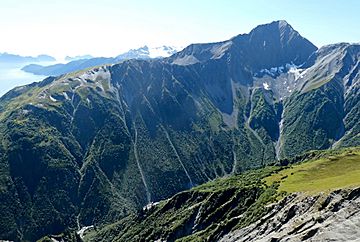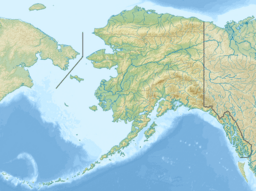Bear Mountain (Seward, Alaska) facts for kids
Quick facts for kids Bear Mountain |
|
|---|---|

North aspect seen from Marathon Mountain
|
|
| Highest point | |
| Elevation | 4,019 ft (1,225 m) |
| Prominence | 869 ft (265 m) |
| Isolation | 1.1 mi (1.8 km) |
| Parent peak | Lowell Peak |
| Geography | |
| Location | Chugach National Forest Kenai Peninsula Borough Alaska, United States |
| Parent range | Kenai Mountains |
| Topo map | USGS Seward A-7 |
Bear Mountain is a tall mountain peak in Alaska, a state in the United States. It stands at 4,019-foot (1,225 m) (about 1,225 meters) high. You can find it in the Kenai Mountains, on the Kenai Peninsula.
This mountain is part of the beautiful Chugach National Forest. It's located about 5 miles (8 kilometers) northeast of Bear Glacier. It's also near other famous spots like Marathon Mountain and the town of Seward, Alaska. The name "Bear Mountain" was first officially recorded in 1951 by the United States Geological Survey. This group studies the land and its features.
The best time to visit and see Bear Mountain is usually in May and June. During clear weather, you might even be able to see the huge Harding Icefield from the top of the mountain!
Mountain Weather
Bear Mountain has a type of weather called a subarctic climate. This means it has very long, cold, and snowy winters. The summers are usually mild, not too hot.
In winter, temperatures can drop very low, sometimes below -20 °C (-4 °F). With the wind, it can feel even colder, below -30 °C (-22 °F).
The water from melting snow and rain flows down the mountain. Water from the north side goes into Lowell Creek. Water from the south side flows into Spruce Creek. Both of these creeks eventually empty into Resurrection Bay.
 | Anna J. Cooper |
 | Mary McLeod Bethune |
 | Lillie Mae Bradford |


